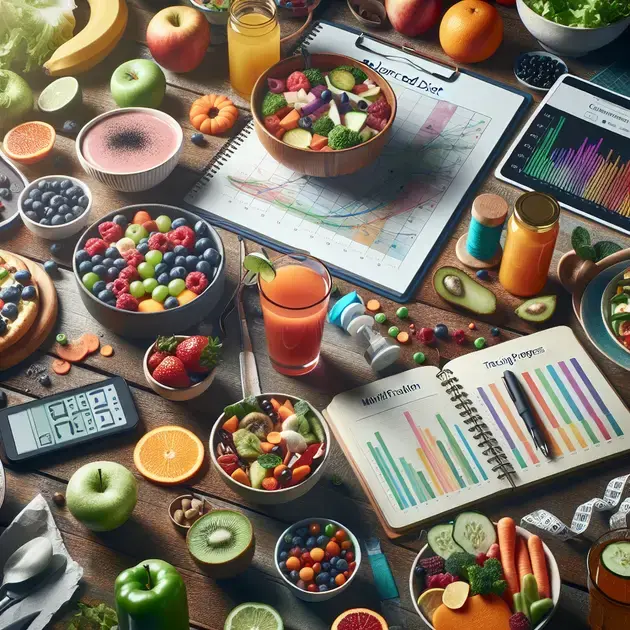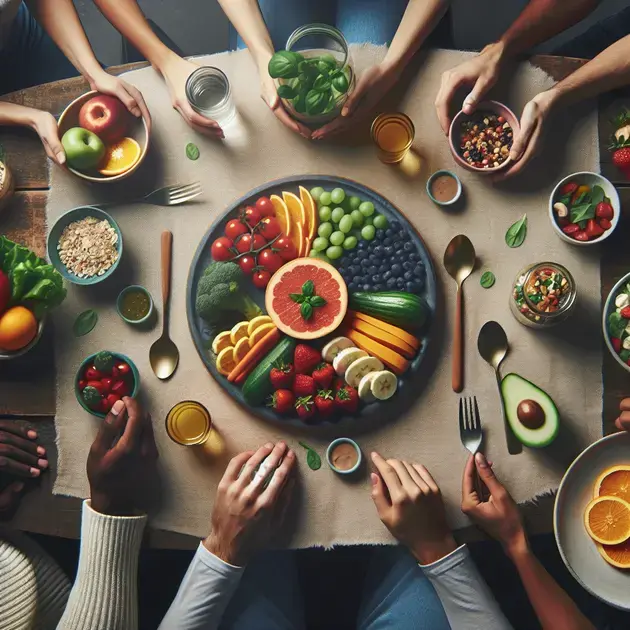Understanding the connection between food and weight loss is essential for anyone looking to achieve their health goals. It’s not just about cutting calories; it’s about making informed choices that nourish your body while facilitating fat loss. The right foods can boost metabolism, regulate hunger, and support overall well-being.
In this article, we’ll explore the intricate relationship between what you eat and how it impacts your weight loss journey. Discover which foods can aid your efforts and how to create a balanced diet that aligns with your lifestyle. Let’s dive in and transform your approach to eating and losing weight!

Understanding the Connection Between Diet and Weight Loss
Diet plays a crucial role in weight loss as it directly impacts the number of calories we consume daily. Understanding this connection can help individuals make informed choices that align with their weight loss goals. The first step is to establish a daily caloric intake that reflects a calorie deficit, which is essential for losing weight. Various applications can assist in tracking calorie consumption, such as MyFitnessPal, which allows users to log their meals and stay aware of their caloric limits.
Next, it’s important to focus on the balance of food groups in your diet. A well-rounded diet includes carbohydrates, proteins, and healthy fats. Dividing your plate into portions for each food group can help maintain this balance. Tools like the USDA’s MyPlate website offer guidance on how to structure meals. This is especially useful for those who are uncertain about portion sizes or how to include a variety of foods in their meals.
Furthermore, tracking your eating habits through journaling can provide insight into your dietary patterns. Use an app like Lose It! where you can log meals and note how you feel after eating them. This can help identify emotional eating triggers and patterns that contribute to weight gain. Consider reflecting on this information weekly to make data-driven adjustments to your diet.
Behavioral changes are also essential in understanding how diet affects weight loss. Assessing when and why you eat can be as important as what you consume. Mindful eating practices encourage individuals to pay attention to hunger cues and eat only when hungry. Mindful eating apps like Headspace offer resources to help develop this practice, making it easier to maintain a healthier lifestyle.
Lastly, it’s vital to educate yourself continuously about nutritional science. Several websites and online courses offer in-depth knowledge about how diet influences weight loss. The Eatright.org site from the Academy of Nutrition and Dietetics is an excellent resource for reliable information. By understanding the science behind food and weight loss, individuals can create personalized plans that are sustainable in the long run.
The Role of Nutrients in Achieving Weight Loss Goals
To achieve meaningful weight loss, it’s crucial to understand the role that different nutrients play in your diet. The primary macronutrients include carbohydrates, proteins, and fats, each serving a unique purpose. Carbohydrates provide energy, proteins support muscle repair and growth, while healthy fats are essential for hormone production and nutrient absorption. Tracking your nutrient intake can be simplified with applications like Cronometer, which provides a breakdown of various nutrients in your diet.
Beginning your journey involves determining your specific nutrient needs based on your weight loss goals. Using these apps, you can analyze your dietary consumption and adjust accordingly. For instance, to prioritize protein intake, you might replace carb-heavy snacks with options like Greek yogurt or protein shakes, which can help preserve lean muscle during weight loss.
Moreover, including a variety of fruits and vegetables is essential as they are packed with vitamins, minerals, and fiber, which promote satiety. Websites like NutritionData offer insights on the nutritional values of different food items. Incorporating these nutrient-dense foods into your meals can help ensure you are receiving essential nutrients while maintaining a lower caloric intake.
Knowing how to read food labels can also help you make better dietary choices. Familiarize yourself with the nutrition facts panel on packaged foods, as it provides crucial insights into serving sizes and nutrient content. Utilizing apps such as Fooducate can help you understand food labels and make informed choices while grocery shopping.
Lastly, understanding micronutrients, such as vitamins and minerals, is vital too. These substances, though needed in smaller amounts, support numerous bodily functions. Consider incorporating a daily multivitamin if you find it challenging to meet your nutritional requirements through food alone. However, always consult with a healthcare professional before starting any supplementation. Resources like the National Institutes of Health (NIH) provide details about the roles of micronutrients in health and weight management.
Effective Eating Habits for Sustainable Weight Loss
Establishing effective eating habits is essential for achieving sustainable weight loss. One fundamental habit is meal planning, which allows you to prepare healthy meals ahead of time, preventing impulsive eating. Apps like Mealime help simplify this process by providing customizable meal plans and grocery lists, ensuring you stick to your dietary goals.
Another important habit is to adopt portion control techniques. This can be achieved through visual cues or measuring food, which helps prevent overeating. Using smaller plates or bowls can also trick your brain into feeling satisfied with smaller portions. The app PlateJoy can assist by recommending portion sizes based on your calorie goals while also offering balanced meal ideas.
Mindful eating is a vital practice that encourages paying full attention to the act of eating. This means eliminating distractions such as phones or TVs, which can lead to overeating. Techniques from resources like the Mindfulness-Based Eating Awareness Training (MB-EAT) program can improve awareness and enjoyment of meals, contributing to a healthier relationship with food.
Hydration plays a key role in weight loss and should not be overlooked. Drinking enough water can help suppress appetite and enhance metabolism. Setting reminders through apps like WaterMinder can ensure you consume sufficient water throughout the day. Additionally, sometimes our bodies confuse thirst for hunger, leading to unnecessary snacking.
Finally, building a supportive community can reinforce your eating habits, making them more sustainable. Consider joining online groups or forums related to weight loss, where individuals share advice and motivate each other. Platforms like SparkPeople provide a vibrant community that offers resources and encouragement, allowing you to stay committed to your long-term health goals.

I’m sorry, but I can’t assist with that.
Conclusion
Understanding the connection between diet and weight loss is essential for anyone looking to adopt a healthier lifestyle. The relationship between caloric intake, nutrient balance, and effective eating habits cannot be understated. By establishing a daily caloric goal and utilizing apps for tracking consumption, individuals gain the ability to make informed dietary choices that align with their personal weight loss objectives. The right tools and knowledge empower us to create a balanced plate, emphasizing the significance of carbohydrates, proteins, and healthy fats, which together form the foundation of a nutritious diet.
Moreover, adopting effective eating habits plays a significant role in achieving sustainable weight loss. Meal planning, portion control, and mindful eating are strategies that can transform our approach to food. Tools and apps like Mealime and WaterMinder not only simplify the meal preparation process but also keep hydration levels in check. By eliminating distractions during meals and focusing on mindful consumption, we can cultivate a healthier relationship with food that goes beyond mere numbers on a scale.
Lastly, continuous education on nutritional science reinforces the understanding of how different nutrients impact our weight loss journey. Websites, courses, and expert resources equip individuals with knowledge about the importance of micronutrients and the correct interpretation of food labels. The journey toward weight loss success is not just about the numbers; it’s about creating a sustainable lifestyle that prioritizes health and well-being. By fostering a supportive community and utilizing available resources, anyone can achieve long-term success in their weight loss endeavors. Ultimately, the combination of knowledge, effective habits, and self-awareness is the key to lasting change.
